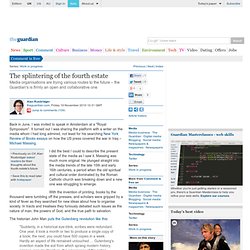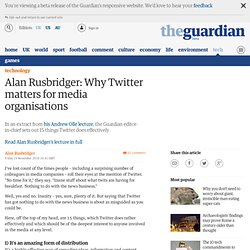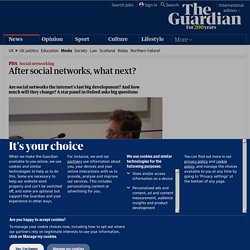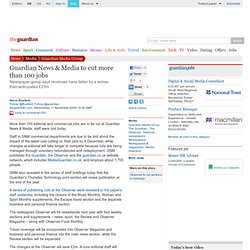

Revenue. The splintering of the fourth estate. Back in June, I was invited to speak in Amsterdam at a "Royal Symposium".

It turned out I was sharing the platform with a writer on the media whom I had long admired, not least for his searching New York Review of Books essays on how the US press covered the war in Iraq – Michael Massing. • Previously on Cif: Alan Rusbridger asked readers for their thoughts about the fourth estate's future • Save this to read later with Instapaper I did the best I could to describe the present state of the media as I saw it. Massing was much more original. He plunged straight into the media trends of the late 15th and early 16th centuries, a period when the old spiritual and cultural order dominated by the Roman Catholic church was breaking down and a new one was struggling to emerge. With the invention of printing, books by the thousand were tumbling off the presses, and scholars were gripped by a kind of fever as they searched for new ideas about how to organise society.
That's not dead as an idea. 1. Why Twitter matters for media organisations. I've lost count of the times people – including a surprising number of colleagues in media companies – roll their eyes at the mention of Twitter.

"No time for it," they say. "Inane stuff about what twits are having for breakfast. Nothing to do with the news business. " Well, yes and no. Inanity – yes, sure, plenty of it. Here, off the top of my head, are 15 things, which Twitter does rather effectively and which should be of the deepest interest to anyone involved in the media at any level. 1) It's an amazing form of distribution It's a highly effective way of spreading ideas, information and content. Guardian phone app: It’ll cost you. After social networks, what next? In digital media, as in fortune-telling, the future is pretty much treated as part of the present.

"What is the next big thing? " is a question everyone who works with the internet asks continually. But after several years of boom, the question of what comes after social platforms is no longer so remote. Luckily, some experts just gave us answers. On Monday evening, the Said Business School in Oxford had invited some very bright and successful entrepreneurs who spoke in front of a packed alumni audience as Silicon Valley came to Oxford for the ninth year. The first expert to confront us with an answer was Peter Thiel, who co-founded PayPal and made early investments in Facebook and LinkedIn. "If you look back from today, it becomes clear that in 2002 even experts missed that Google had already become the main search engine. He asked the audience: "Where in the history of social network are we? Being the CEO of Twitter, Biz Stone was quite sure that for him that wasn't the case.
Guardian News. More than 100 editorial and commercial jobs are to be cut at Guardian News & Media, staff were told today.

Staff in GNM commercial departments are due to be told about the impact of the latest cost cutting on their jobs by 9 December, while changes at editorial will take longer to complete because cuts are being managed through voluntary redundancies and redeployment. GNM publishes the Guardian, the Observer and the guardian.co.uk website network, which includes MediaGuardian.co.uk, and employs about 1,700 people. GNM also revealed in the series of staff briefings today that the Guardian's Thursday Technology print section will cease publication at the end of the year. A series of publishing cuts at the Observer were revealed to the paper's staff yesterday, including the closure of the Music Monthly, Woman and Sport Monthly supplements, the Escape travel section and the separate business and personal finance section.